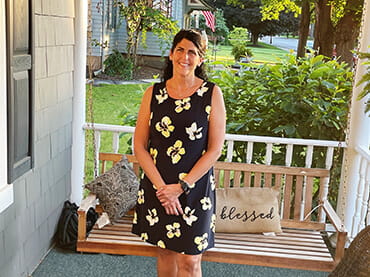Tracie Ostoffie – Long COVID
Tracie Ostoffie describes herself as a “high energy” person – she typically prefers to spend time outdoors over binge-watching a TV series. Her job as an information technology (IT) manager keeps her busy when she’s not skiing, fishing, or traveling with her son.
But after being diagnosed with COVID-19 in January 2021, Tracie could barely muster the strength to move from her bed to the couch. To make matters worse, her symptoms didn’t completely resolve with time. After the virus cleared, she was left with respiratory issues like shortness of breath, and “brain fog” – a general cloudy feeling characterized by difficulty concentrating, a feeling of confusion, and other neurological effects.
Tracie was experiencing post-acute coronavirus (COVID-19) syndrome, also known as “long COVID.” Long COVID describes a host of effects that people experience after being infected with the COVID-19 virus. For weeks, months, or in Tracie’s case, more than a year, people report fatigue, confusion, partial or complete loss of taste and/or smell, shortness of breath, and more symptoms. The cause of these effects is still unknown.
Tracie was referred to the UPMC Post-COVID Recovery Clinic in August 2021 where she was under the care of experts who are dedicated to learning about and improving her condition. At the clinic, she and other patients have access to leading experts in the field who work collaboratively with primary care physicians to develop effective treatment plans.
Lingering Symptoms from COVID-19
When Tracie was first diagnosed with COVID-19, she had a fever, burning sensation in her nose, and intense headaches for more than a week. She also experienced bouts of vomiting and almost completely lost her sense of smell.
“I couldn’t smell or taste anything except banana,” Tracie said. “My friends would just drop off value packs of banana ice pops at my porch, so I ate about a million of those.”
At one point, Tracie visited an urgent care where doctors sent her to the emergency room because they feared she had bronchitis. Her family, friends, and coworkers noticed her deteriorating condition – what used to be a simple walk with her dog now left her completely out of breath. When she went to schedule a vacation, she opened her laptop and realized she didn’t know where to begin.
“I sat in front of my computer – keep in mind I book travel plans all the time – and I didn’t know what to do,” Tracie said. “It scared the death out of me.”
By March, two months after she was initially diagnosed with COVID-19, Tracie knew she needed to seek help. Her PCP ran comprehensive blood, heart, lung, and neurological tests but struggled to determine an effective treatment plan. She was referred to a variety of doctors that specialize in neurology, psychology, and rheumatology, but only saw little improvement in her condition.
It wasn’t until a visit with a cardiologist in August that Tracie was referred to the UPMC Post-COVID Recovery Clinic.
An Effective Treatment Plan for Long COVID-19 Symptoms
Tracie’s team, comprised of her PCP, physician assistants, and doctors at the UPMC Post-COVID Recovery Clinic, developed a treatment plan that eased her shortness of breath and improved her brain fog.
“I was lucky because I had two thorough doctors that were all over it,” Tracie said. “They were so intrigued and wanted to know what was really going on.”
At first, the team wanted to prescribe Methylphenidate HCl (also known as Ritalin®) to help with her neurological symptoms. Tracie was hesitant to try it because of negative side effects she had with a medication in the past.
To get Tracie on an effective medication to treat her brain fog, one of the doctors at the clinic performed a pharmacogenomic test, which lets doctors know how your body will respond to certain therapeutic drugs. The results of the test showed that Ritalin® could have negative side effects for Tracie.
The test allowed Tracie’s doctors to prescribe her a medication that helped her do “a complete 180” without any negative side effects.
“I started taking the medication and it just totally changed everything,” Tracie said. “I’ve been getting organized, getting all my ducks in a row in the morning, not feeling confused, and just staying on track, and then I do mindfulness meditation as needed.”
Tracie took a short-term leave from her job as an IT manager beginning in September. Since then, UPMC experts have started her on a comprehensive treatment regimen that includes medication to help her brain fog, albuterol to ease her shortness of breath, and cognitive behavioral therapy. Thanks to her treatment – which she’s continuing in close collaboration with UPMC experts at the clinic – she was able to return to work in December and get back to skiing, traveling, and all her favorite hobbies.
“I feel like the team at the clinic has done everything possible to try and help me,” Tracie said. “Overall, I’ve had a great experience with UPMC.”
Tracie’s treatment and results may not be representative of similar cases.

















